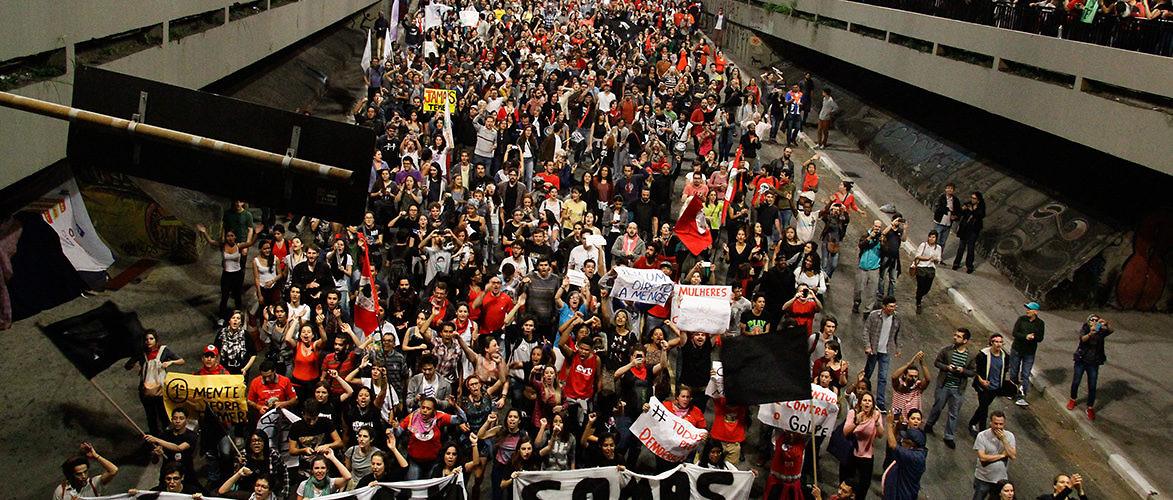Demonstrations are held against new Brazilian President Michel Temer. Sao Paulo, Brazil, September 4, 2016. (Fabio Vieira/FotoRua/NurPhoto/Associated Press)
On August 31, the Brazilian Senate voted 61 to 20 to remove President Dilma Rousseff from office. Ending a six-month investigation into allegations that Rousseff manipulated the federal budget, the impeachment marked a significant turn in Brazilian politics after 13 years of Workers’ Party presidents.
New Brazilian President Michel Temer faces major political and economic challenges, not least the lingering corruption scandals that also affect his government, growing public opposition, and the country’s ongoing economic crisis. While the outcome of the Senate vote was widely expected, Brazil now faces an uncertain future and the implications will resonate across the rest of Latin America. Of particular concern is that Rousseff’s impeachment sets a worrying precedent that a president can be removed for relatively minor transgressions when compared to the high levels of corruption found among Brazilian politicians, leaving fundamental problems unaddressed.
The Brazilian crisis has occurred at a time when Latin American as a whole is suffering a political maelstrom. Rousseff’s impeachment reflects declining support for democracy and low confidence in democratic institutions in many nearby countries. Its position as the region’s largest democracy and its aspirations as a global and regional power mean that its political fortunes will undoubtedly shape what happens elsewhere.
The aftermath of last week’s events indicates that we can expect a shift in Brazil’s role in the region, particularly in its relations with countries run by left-wing presidents. The previous administrations of Rousseff and Luiz Inácio Lula da Silva prioritized friendly relations with Latin American governments across the political spectrum. In contrast, the impeachment vote led to an immediate cooling off of Brazil’s ties with Bolivia, Ecuador, and Venezuela, with their respective administrations condemning Rousseff’s removal from office as undemocratic, leading to mutual threats to withdraw ambassadors.
Although it is unlikely that Brazil will freeze diplomatic relations with former allies, the new government has taken a hardline approach to its critics. Soon after his inauguration, Temer and Foreign Minister José Serra traveled to Hangzhou in China to attend the G20 Summit. While one of their primary goals was to secure Chinese investment for Brazil’s struggling economy, both Temer and Serra attempted to defuse accusations that Rousseff was removed from office by undemocratic means, thereby trying to use the event to establish the new government’s international reputation. In interviews, they were also at pains to minimize the significance of the anti-government protesters who are calling for early elections.
Meanwhile, Serra commented to the international press that impeachment had been inevitable, adding that Bolivia and Ecuador could learn something from Brazil’s experience, while calling Venezuela “anti-democratic.” Serra’s observations provide a further indication that the new government is unlikely to support presidents in these other countries if they face challenges outside the electoral cycle. Given Brazil’s previous attempts to mediate in the Venezuelan crisis, this suggests a policy shift that could shape the regional response to Venezuela.
Another fundamental cause for concern is declining support for democracy in Latin America. As opinion polls conducted by Latinobarómetro show, the regional preference for this form of government has fallen steadily since 2010. This reflects a decline in economic growth, which in turn has sparked uncertainty and discontent. The debates surrounding Rousseff’s impeachment make this issue particularly salient for Latin America’s political future, particularly as the Brazilian crisis highlights the region’s growing polarization.
Brazil’s own support for democracy dropped from its highest level of 55% in 2009 to 32% in 2016, according to the Latinobarómetro poll. Confidence in political institutions and the judiciary has also decreased over the last six years, while only 9% of Brazilians believe that their country is governed for the benefit of the people. Temer himself also has very low approval ratings—14% in July 2016—indicating that Brazilians are unhappy with the government, their economic situation, and the way democracy works in the country.
The profound dissatisfaction with national politics shows that Rousseff’s impeachment is unlikely to resolve Brazil’s problems. While many demonstrators calling for her removal saw it as a solution for everything, the opposing camp viewed the Senate vote as disrespectful of those who voted for Rousseff in the 2014 presidential election. This view was shared by left-leaning governments across Latin America.
Despite the government’s dismissal of anti-impeachment demonstrators as holding a minority position, the protests are unlikely to subside. The Brazilian crisis centers on the question of under what conditions it is justifiable to remove a democratically elected president and exemplifies the democratic dilemmas facing Latin America as a whole. Brazil has become increasingly divided by the impeachment process, leading to instability that will spill over into a region that is already in a state of flux.
Marieke Riethof is Lecturer in Latin American Politics at the University of Liverpool.





